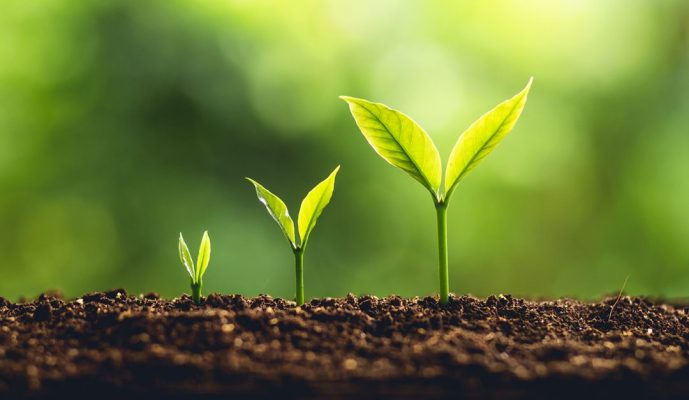What is Organic Agriculture
Since the early twentieth century the plants’ yields has been doubled in each surface area. This increase in yield is mainly due to the use of chemical compounds and pesticides. With agricultural mechanization, although production has grown dramatically but human health and the environment have equally endangered. In response to these dangers to man and the environment, mankind came up with an alternative to today’s conventional agriculture. As a result, the concepts of sustainable agriculture, organic and biodynamic agriculture, natural agriculture, ecological agriculture and etc emerged.
There are several names and terms for organic agriculture.It is said that there are about 16 different names around the world for what we call organic agriculture. Some of the best known are biologic agriculture, renewable agriculture and sustainable agriculture. Organic agriculture means the use of traditional and scientific information to reduce the use of pesticides and chemicals in the production of agricultural and livestock products. Organic agriculture is a comprehensive management system that considers the quantity and the quality of the products from production to processing and their transfer to the consumer; it also considers the health of soil, plants, animals, humans, microorganisms, the planet’s environment as a single living organism, ecological principles, environment, Justice principles and social relations and respects creatures and the principles of biological sustainability.
Compost, animal manures and organic fertilizers are used for soil fertility in organic agriculture. In this agriculture, the land suffers from the least manipulation such as plowing and biological fertilizers, proper crop rotation, cover plants, etc are used. As a result, soil erosion is low and soil biodiversity is increased. To produce chemical fertilizers Non-renewable resources such as oil should be used but these materials are not used in organic agriculture.
Organic agriculture seeks to make better use of natural resources so as not to harm the environment and reduce the use of non-renewable materials that harm the environment or harm farmers and consumers. The International Union of Organic Agriculture Movements (IFOAM) defines organic agriculture as follows: Organic agriculture encompasses all agricultural systems that develop the environmental, social and economic aspects of healthy food production and quality. Local soil fertility is the key to doing well in this system.
Its purpose is to optimize all aspects of agriculture and the environment, according to the natural capacity of plants, animals and the appearance of the ecosystem. It significantly reduces inputs from outside the slaughterhouse by avoiding the use of fertilizers, synthetic chemicals, pesticides, and drugs, and instead allows the powerful laws of nature to increase both crop yield and disease resistance. Organic agriculture is connected to the universally accepted principles that are implemented in the framework of local socio-economic, climatic and cultural manifestations. What is now called organic agriculture as a new field in farming has a long history and has been associated with humans since the beginning of agricultural activities. Human being has always treated natural resources with the principle of mutual respect and life experience has proven to him that any damage to the environment has unpleasant consequences.
More Details
There are different opinions about the origin and emergence of organic agriculture, the emergence of organic agriculture goes back to Howard Publications. Integrated, decentralized, and chemical-free agriculture was introduced in 1940 by North Burn. He was the first to use the term organic agriculture and introduced this type of agriculture to the field of science. Others believe that in 1924, the Austrian scientist Rudolf Steiner introduced a view of agriculture that originated from the spiritual sciences and the knowledge of human nature. His ideas laid the foundation for the creation and development of biodynamic agriculture. Around the same time, Dr. Hans Müller founded a movement in Sweden to reform the agricultural system based on Christian beliefs in order to preserve the land and family farms. Today, the trend towards organic agricultural products has increased very much. People prefer to use more pure and healthy products. Therefore, it seems that the definition of organic agriculture is both important and necessary from the perspective of rural development. What is the definition of organic agriculture from the perspective of rural development? The existence of different names in different sectors of organic agriculture, as well as the use of methods and the application of specific practical methods to achieve it, has prevented the providing a short, accurate and clear definition of this type of agriculture.
Organic agriculture has been proposed under different names such as organic farming, environmentally friendly agriculture, agriculture that uses less non-farm inputs, agriculture with rotational power and alternative agriculture. Organic agriculture means the use of scientific information to reduce the use of pesticides and chemicals in the production of agricultural products. Organic agriculture systems are based on ecosystem management and are not dependent on off-farm inputs. Organic agriculture is a good production management that strengthens and develops the health of biological ecosystems, life cycle and biological activities of the soil. This theory emphasizes on using in-farm inputs. For this purpose, we need adaptive systems in each region. This allows the use of biological and mechanical farming methods without the use of synthesized foreign inputs.
Misconceptions about organic agriculture
One of the misconceptions about organic agriculture is that in this way, the farmer does not need to use chemicals. It should be noted that the structure of all living and non-living organisms is composed of chemical compounds. In fact, it should be said that naturally occurring chemicals are used in organic farming and in fertilizing the soil or protecting plants and raising livestock. Another misconception about organic farming is that organic farming is thought to mean a return to traditional agriculture that was common years before mechanization of agriculture.
Organic farmers cannot see themselves needless of the scientific achievements of the last 50 years. In fact, organic agriculture tries to free itself from the agrochemical compounds by using the findings of life sciences in the form of advanced techniques and helps improve the quality of soil and agricultural products. Some of the topics discussed in organic agriculture are: crop rotation, intercropping, mechanical methods of weed control, better understanding of mycorrhiza coexistence, rhizobia and rhizosphere, regeneration of organic matter and other living soil parts, integration of agriculture and animal husbandry.
Why do we choose?
By considering the growing demand for organic agricultural products, we can export organic agricultural products to other countries by observing the standards and provided that we reduce pesticides, chemicals and additives. The market value of organic agricultural products in the world is 1.7 to 4 times more than ordinary products, so if Iranian farmers can produce and export organic products, the value of agricultural exports will be increased 2 to 4 times. The added value of agricultural products will be quadruples by producing and exporting of organic products. The United States, Europe, and the Far East are currently the world’s largest consumers of organic products. The market for organic products in the United States is 51%, Europe 46% and the rest of the world 3%.
An important reason for the global demand for organic products is the better taste, more nutritional properties and naturalness of these products compared to products produced in the conventional crop system and modified products. Studies show that the nutritional value of vitamins and minerals in biological and non-organic products is much higher than in conventional system products; for example the content of vitamins such as vitamin B, vitamin C, vitamin E and lycopene, and minerals such as magnesium, iron and zinc in garden products such as tomatoes, and the beneficial antioxidants and amino acids are higher than other products.
Organic agriculture is compatible with ecology and stabilizes soil texture, maintains water cycle, carbon cycle, food cycle and also it causes less soil and drinking water pollution. Organic agriculture both helps preserve biodiversity and uses biodiversity. At the ecosystem level, the conservation of natural resources in areas under organic farming and the lack of chemicals will preserve wildlife. The use of genetically modified (transgenic) products in organic agriculture is not allowed, because the effects of genetically modified products are not yet well known and genetically modified plants pose many risks to the environment.
Avoid Non-Organic Agricultural Products
Today, high consumption of pesticides and chemical fertilizers in agricultural products around the world, especially in Iran, is a major health problem. At present, the per capita consumption of pesticides in agricultural products in our country has increased by 400 grams per person; the amount of chemical fertilizer consumption also has increased from 2.5 to 3.5 million tons in the last 10 years. In conventional agriculture, more than 300 types of hazardous chemical compounds such as pesticides, herbicides and chemical fertilizers are used to control pests and insects and to fertilize the soil. It is deposited in agricultural products, for example in fruits and vegetables, and will be transmitted to the human body during consumption.
Residues of toxins and chemicals in agricultural products plays an essential role in the development of diseases of the gastrointestinal tract, immune system, endocrine glands, nervous system and carcinogenicity in organs, congenital anomalies in infants, low birth weight, abortion, premature puberty and reduced sperm numbers. Researches on the side effects of these substances show that 60% of pesticides, 90% of fungicides and 30% of insecticides are carcinogenic.
Basics of Organic Agriculture
The principles and goals of organic agriculture are summarized by the World Federation of Organic Agriculture Movement as follows:
- Producing high quality food.
- Harmony with nature, instead of dominating over it.
- Strengthening biological cycles in cropping systems, including the strengthening of microorganisms, fauna and flora of soil and increasing plant and animal diversity.
- Maintaining and increasing soil fertility in the long run.
- Using renewable resources as much as possible.
- Providing living conditions for livestock that allow them to experience all instinctual behaviors.
- Preventing all forms of pollution caused by various agricultural operations.
- Preserving the genetic diversity of the agricultural system and the environment, including the protection of plants and natural habitats.
- Ability to earn enough income for farmers and their satisfaction and also create a healthy work environment.
- Considering the broader social and ecological effects of the crop system.

Wood vinegar fertilizer is widely used in agricultural production in the United States, Japan, South Korea and other countries. In the United States, wood vinegar is used in horticulture and the fruit industry. n contrast, the highest use of wood vinegar is in Japan. In Japan, about 50,000 tons of wood vinegar is produced each year, about half of which is used in agricultural production, mainly to promote crop growth and control nematodes, pathogens and viruses. Organic fertilizer, when used properly, the possibility of root burning in the plant becoming very low, but if chemical fertilizer obtained from mineral salts that do not have good quality or use improperly will destroy the plant roots and soil microorganisms.
Wood vinegar is an organic fertilizer and is a product that is completely derived from nature therefore has no harmful environmental effects and adverse effects on living organisms. Wood vinegar is one of the organic compounds and has more than 200 substances including organic acid, phenol group, carbonyl group, alcohol, natural materials, ammonia, methylamide and dimethylamide. It reduces the use of chemical fertilizers and increases soil nutrients, growth rate of roots, stems, tubers, leaves, flowers and fruits. Wood vinegar is a healthy substance for humans, animals, plants and the environment.
Knowledge-based Group of the Fifth Season (Fasl 5) by considering the position and the global approach to organic agriculture and with the aim of improving the quality of organic products has entered the field of national production to be able to contribute significantly to both national production and organic agriculture.



